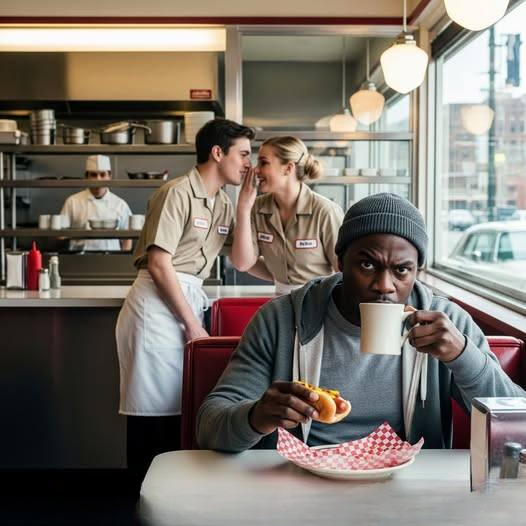Jordan Ellis was the kind of man who drew attention effortlessly — sharp suits, confident gait, and an unmistakable aura of accomplishment. As the self-made founder of Ellis Eats Diner, he had built a citywide favorite from a humble food truck, spending ten years grinding through sleepless nights and endless challenges to reach the pinnacle of success.
But even the most driven leaders can lose touch with the foundation beneath them.
Over the past year, Jordan had noticed troubling signs: rising complaints, harsh online reviews, and whispers of rude service. The chain he had grown from a labor of love into a community hub was now described as cold and uncaring.
He could have handled it the usual way — send managers, issue memos, or blame staff. But Jordan chose differently. He would walk into his own restaurant, unnoticed, as an ordinary customer.
It was a bitter Monday morning when he stepped from his SUV. Gone were the tailored suits and luxury watch. Instead, he wore faded jeans, an old hoodie, and a knit cap pulled low. No air of authority, no scent of designer cologne — just a man blending into the crowd.
His target was the downtown location, the very first Ellis Eats. The diner where he had learned from his mother’s laughter and warmth, and where kindness had always been the secret ingredient.
As he entered, the smell of coffee and sizzling bacon filled the air, but the expected warmth was gone. Behind the counter stood two women: one young, chewing gum and scrolling on her phone, the other older, her name tag reading Denise, looking tired and disinterested. Neither acknowledged him. Thirty seconds passed. Forty. Denise muttered, “Next.”
Jordan stepped forward, voice calm and disguised. “Morning.”
“Yeah?” the younger one replied flatly.
“I’ll have a bacon, egg, and cheese sandwich, and a black coffee.”
“Seven fifty,” Denise said with an exasperated sigh. She grabbed the money, dropped the change on the counter, and turned away.
Sitting in a corner booth, Jordan surveyed the room. The diner was half full, yet lifeless. Staff moved like automatons. A mother struggled with restless children, an elderly man asking about a discount was brushed off, and when a busboy dropped a tray, an angry curse rang out.
Then came the line that made Jordan’s stomach twist. The young cashier leaned toward Denise and whispered, audible enough for him to hear: “That guy smells like he’s been sleeping on the subway.”
Denise laughed. “Bet he’ll want extra bacon too.”
Jordan gripped his coffee. It wasn’t anger — it was heartbreak. The diner had been built on dignity and respect, yet these employees mocked customers for nothing.
When a construction worker politely asked for a glass of water, Denise snapped, “Don’t hang around here if you’re not buying anything.”
That was the breaking point.
Jordan stood, approaching the counter. “Excuse me,” he said. Denise barely looked up. “Sir, if you have a complaint, the customer service number is on your receipt,” she replied.
“I don’t need a number,” he said evenly. “I have one question: do you treat all your customers this way, or only the ones you think don’t belong?”
The young cashier froze. Denise frowned. “We didn’t—”
“Didn’t do anything wrong?” Jordan’s calm voice sharpened. “You insulted a paying customer and turned away someone just asking for water. This isn’t a private club. This is my restaurant.”
He removed his cap. “I’m Jordan Ellis, owner of Ellis Eats.”
Silence fell. Customers turned, the cook peeked through the kitchen window, and Denise’s face went pale.
“I built this diner from the ground up,” Jordan continued. “My mother baked pies here when we could barely pay rent. We opened this place for everyone — students, workers, parents, anyone needing a warm meal and respect. You don’t get to decide who deserves that.”
Denise stammered. “Sir, I—”
“No,” he interrupted. “The cameras caught everything. And yes, we’ll review it.”
A manager hurried out. “Mr. Ellis? I didn’t know you were coming.”
“Clearly not,” Jordan said. “These two are suspended immediately. We’ll decide on retraining later.”
Turning to the women, he said, “If you want to work here, learn what respect looks like. Watch closely.”
The women left silently.
Jordan tied on an apron, washed his hands, and took over the counter. He greeted customers warmly, refilled coffee cups, balanced trays, laughed with the cook, and treated everyone like family. When the construction worker returned, Jordan handed him coffee. “On the house,” he said. “Thanks for your patience.”
The man smiled. “You’re the owner?”
“Yes,” Jordan said. “And I apologize for how you were treated earlier. That’s not who we are.”
By lunchtime, word had spread. Customers whispered, took photos, and watched the millionaire owner scrub tables and serve breakfast. An elderly man leaned over, murmuring, “Wish more bosses did this.”
Jordan smiled. “So do I.”
Later, outside the diner, he pulled out his phone and sent a message to HR: “New policy — every employee must work one shift with me. No exceptions.”
Returning inside, Jordan served a homeless man a free meal and coffee. “You’re always welcome here,” he said.
For the first time in years, Jordan felt like the leader he had always wanted to be — not from a corner office, but behind the counter, leading with heart, one plate at a time.
